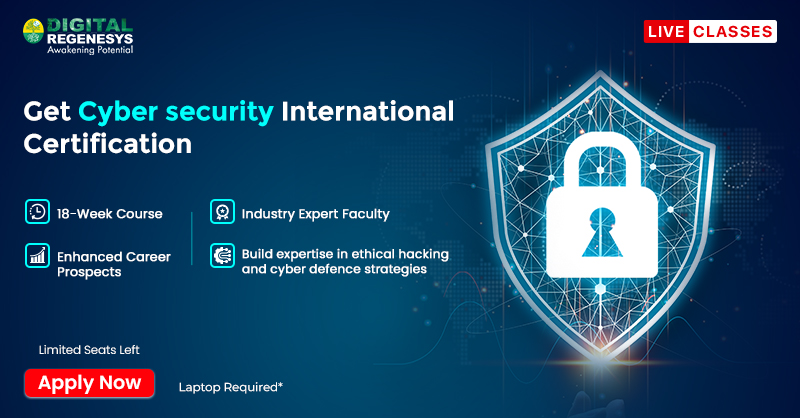How a Cybersecurity Course in South Africa Can Propel You Forward?

Cybersecurity has become a top priority for businesses, governments, and organisations across South Africa, as digital threats continue to grow in complexity and scale. A career in cybersecurity is not only highly relevant but also offers strong growth potential.
A cybersecurity course equips you with the knowledge and practical skills to safeguard networks, systems, and sensitive data from cyberattacks.
In South Africa, where digital transformation is accelerating across multiple sectors, skilled cybersecurity professionals are in high demand.
In this article, we explore how earning a cybersecurity course in South Africa can enhance your career, increase your earning potential, and open doors to a range of roles in both local and international markets.
Let’s begin by examining the growing demand for cybersecurity professionals in South Africa.
Growing Demand for Cybersecurity Professionals in South Africa
South Africa has experienced a substantial rise in cyberattacks, data breaches, and online fraud over the past few years. Companies across various industries are seeking experts who can effectively prevent, detect, and respond to security threats.
A cybersecurity course prepares you for these challenges by combining technical skills with strategic thinking. Organisations value graduates who can design secure networks, implement compliance protocols, and stay ahead of evolving threats.
Here’s why cybersecurity is a promising career in South Africa:
- High Job Demand: Organisations need skilled professionals to protect sensitive information.
- Critical Role: Cybersecurity is essential for business continuity and trust.
- Diverse Opportunities: Careers span government, finance, healthcare, tech, and consulting.
- Global Relevance: Skills are transferable to international markets.
Get insights on How Do I Start A Career In Cyber Security?

Benefits of a Cybersecurity Course
A cybersecurity course provides both foundational knowledge and practical experience, equipping graduates to handle real-world challenges. Beyond technical skills, students learn risk assessment, ethical hacking, and incident response strategies.
South African universities and institutions emphasise hands-on training, preparing graduates to enter the workforce with confidence. Employers recognise course holders for their expertise, problem-solving abilities, and preparedness to mitigate cyber risks.
Key benefits of earning a cybersecurity course include:
- Comprehensive Knowledge: Understanding of networks, encryption, and security protocols.
- Practical Skills: Hands-on labs and real-world simulations.
- Career Readiness: Ability to handle threats from day one.
- Professional Credibility: A course opens doors to advanced certifications and roles.
Career Opportunities in Cybersecurity
Graduates with a course in cybersecurity have access to a wide range of career paths. Demand is exceptionally high in sectors like banking, government, telecommunications, and consulting.
South African companies seek professionals who can adapt to evolving threats and implement robust security strategies. Cybersecurity roles often offer attractive salaries and opportunities for career growth.
Typical roles for cybersecurity graduates include:
- Security Analyst: Monitors networks for vulnerabilities and incidents.
- Ethical Hacker/Penetration Tester: Tests systems to identify weaknesses.
- Security Consultant: Advises organisations on security best practices.
- Network Security Engineer: Designs and implements secure network infrastructures.
- Incident Response Specialist: Responds to breaches and mitigates risks.
Know more about Who Should Consider a Cybersecurity Course for Personal Knowledge.
Essential Skills Gained from a Cybersecurity Course
A course equips you with both technical and soft skills necessary for cybersecurity roles. Technical knowledge includes network security, firewalls, cryptography, and vulnerability assessment. Soft skills, such as critical thinking, problem-solving, and effective communication, are equally crucial for interacting with stakeholders and leading projects.
Key skills from a cybersecurity course include:
- Technical Skills: Network security, ethical hacking, and incident response.
- Analytical Thinking: Assess risks and solve complex problems.
- Communication Skills: Clearly explain security issues to non-technical teams.
- Compliance Knowledge: Understand and comply with legal and regulatory requirements.
Educational Pathways to a Cybersecurity Career in South Africa
Embarking on a cybersecurity career in South Africa is both accessible and rewarding, thanks to the comprehensive training provided by Digital Regenesys. Their Cybersecurity Certificate Course is designed to equip individuals with the essential skills to protect digital assets and navigate the complexities of the cyber threat landscape.
Course Highlights:
- Duration: 6 months
- Mode: 100% online, offering flexibility to study at your own pace
- Skill Level: Suitable for beginners, with no prior IT experience required
- Certification: Globally recognised IITPSA-certified cybersecurity Course with 19 CPD points upon successful completion
Key Topics Covered:
- Network Security
- Ethical Hacking and Penetration Testing
- Risk Management and Compliance
- Cybersecurity Laws and Ethics
Tools and Technologies:
Throughout the course, students gain hands-on experience with industry-standard tools such as:
- Wireshark
- Burp Suite
- KeePass
- John the Ripper
This practical approach ensures that graduates are well-prepared to tackle real-world cybersecurity challenges.
Career Opportunities Post-Course:
Completing the Cybersecurity Certificate Course opens doors to various roles, including:
- Cybersecurity Analyst
- Ethical Hacker
- Security Architect
- Cloud Security Specialist
With the increasing demand for cybersecurity professionals in South Africa, this course provides a solid foundation for launching or advancing your career in this critical field.
Explore details on Is Cyber Security a Good Career?
Challenges in a Cybersecurity Career
While cybersecurity is a growing field, professionals may face challenges such as the rapidly evolving threat landscape, skill gaps, and high responsibility for safeguarding sensitive data. Continuous learning and adaptability are essential to stay relevant and practical.
Key challenges include:
- Rapidly Evolving Threats: Cyber risks constantly change.
- Skill Gaps: Staying updated with new technologies is critical.
- High Responsibility: Mistakes can have significant consequences.
- Competition: Increasing interest in cybersecurity roles requires continuous upskilling.
Future of Cybersecurity in South Africa
The cybersecurity sector in South Africa is expected to expand as digital adoption continues to grow. Businesses are investing more in AI-powered security, cloud security, and data protection. Professionals with up-to-date skills and a proactive approach will be well-positioned for leadership roles and global opportunities.
Trends shaping the future of cybersecurity include:
- Increased Investment: Businesses prioritising digital security.
- Emerging Technologies: AI, cloud, and blockchain security.
- Global Demand: Skills transferable to international roles.
- Policy and Compliance Growth: Stronger regulations are increasing demand for experts.

Conclusion
A cybersecurity course in South Africa can significantly advance your career by providing in-demand skills, practical experience, and exposure to high-growth industries. Graduates enjoy diverse career options, competitive salaries, and opportunities for global collaboration.
For those looking to start or enhance their cybersecurity journey, enrolling in the Cybersecurity Certificate Course at Digital Regenesys offers hands-on training and expert guidance to propel your career forward.
Visit Digital Regenesys to start your Cybersecurity Certificate Course today.
Last Updated: 15 October 2025